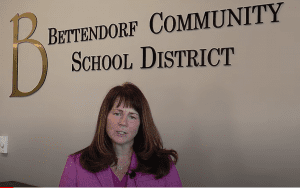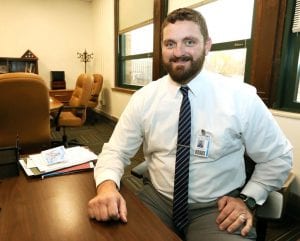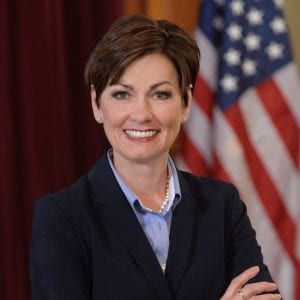Quad Cities Chamber Hosts Four Superintendents to Discuss Education Changes
Last week, Iowa Gov. Kim Reynolds signed a new law mandating schools offer 100% in-person education, and on Friday morning, three Iowa Quad-Cities superintendents discussed that impact – as well as other school changes in an online forum hosted by the Quad Cities Chamber.

The Friday Q-C Chamber panel on education featured (clockwise from upper left) Joe Stutting, Jake Ford, Jay Morrow, TJ Schneckloth and Michelle Morse.
The United Township district superintendent also participated in the webinar on Iowa and Illinois priorities in education.
Bettendorf students will return to 100% in person (from a hybrid model) on Tuesday, Feb. 16, said district superintendent Michelle Morse. A recent parent survey showed 83 percent supported returning their kids to all in-person learning, with the rest 100% online, she said.
“In terms of mitigation strategies, we’re continuing to implement the strategies we found effective this school year,” Morse said of hand sanitizing and requiring masks at all times, with the exception of lunch. “We do our best to create as much social distancing inside and outside the classroom, but we know with 100-percent return, that is going be challenging at times, especially at lunch.”
“We’re ready to go and we’re excited to have our students back – all of them back on the 16th,” she said.
Joe Stutting, superintendent of the North Scott Community School District, said they’ve been all in-person from day one, so the law will not change their schools.
“Our district learned a lot from the beginning of the year until now, to minimize quarantine, minimize spread, so we have made a lot of adjustments in the last two weeks,” he said. They’ve limited no more than two students quarantined from each positive case they had,

The online discussion featured (clockwise from upper left) Joe Stutting, Jake Ford, Michelle Morse, TJ Schneckloth and Jay Morrow.
Stutting said.
They had 15 percent of families choosing 100% online, which is now down to 8 percent, he said.
TJ Schneckloth, Davenport superintendent, said they reconvened their health and safety committees to see if anything needed to adjust for 100% in-person.
“Mask wearing is critical,” he said. “We want our families to know we’re doing the best that we can to get six feet (distance), but it’s really not going to be possible when we’re full-time face to face. We’ve had about a third of our students from the start of the school year in an online platform.”
Jay Morrow, superintendent of East Moline’s United Township High School District 30, said it’s certainly been a challenging school year. Two-thirds of students are in a hybrid combination of in-person and remote learning, with the rest completely online.
“We have basically a highway in our hallways – with a right lane, left lane and median, with hand-washing stations in the median, to keep the kids as spaced out as much as possible,” Morrow said. “I’m very proud of our kids, and our faculty and staff. They’ve done a wondrous job of adjusting to these really challenging circumstances.”
Between March and July, they equipped every student with a Chromebook, and when they’re at home, having reliable wi-fi access is

The online discussion featured (clockwise from upper left) Joe Stutting, Jake Ford, Michelle Morse, TJ Schneckloth and Jay Morrow.
essential, he said. About 70 percent of district kids qualify for free and reduced lunch, and half didn’t have reliable Internet access at home.
Morrow looked with the elementary school district, and agreed to spend $140,000 on wireless hotspots for families. The two districts got a $100,000 grant from the Quad Cities Community Foundation, and support from United Way, and have developed a plan (two months away to start) to improve wi-fi for homes.
“We hope this is a model we can deliver quality wi-fi to our community within the next year,” Morrow said.
Facing challenges with remote learning
Bettendorf has worked with local Internet providers for access, and wireless hotspots, Morse said. Students have devices at home during the hybrid model, and families have the option for curbside pickup of nutritious lunches, she said. If families can’t pick up, there are volunteers who deliver meals to them.
“Students whose parents are both working, who need to be in a childcare setting or with grandparents during the day, our district and Pleasant Valley collaborated with our local Y – which is a very big childcare provider,” Morse said. Each district provided a licensed teacher at the site for students.
“That’s been a challenge, so on their off-learning days, how we can continue to support those students and make sure they’re still accessing

Michelle Morse is superintendent of the Bettendorf Community School District.
their learning,” she said.
Stutting said there’s no replacing face-to-face education, so that’s been a challenge.
“One of the biggest things all four of us are carrying around is, how are we going to recoup that?” he asked. “When we get our students back face to face 100%, all of them, how are we going to ensure that we’re providing the best education? That’s another challenge for us.”
“Student engagement online is a challenge,” agreed Schneckloth. “That’s where every one of our district – whether our families chose to be online full-time or hybrid situations, I’ve talked to many superintendents. And many shake their heads — student engagement is a challenge that will result in bigger gaps of online families who choose not to engage.”
Addressing open enrollment plans
The Iowa House this week passed a bill that would force school districts with diversity plans to accept open enrollment requests from students who want to attend a different public school.
Davenport has 4,000 students in grades 7-12 that take career and technical programs; 19 engineering apprentice students; 18 advanced placement courses; 200 students from Davenport North who have graduated with an associate’s degree; 200-plus students in the Creative Arts Academy, and Project Lead the Way K-12 computer science program.
“The pending legislation, when we lose students to open enrollment, to charters, vouchers, whatever it be – it’s gonna have a financial impact

TJ Schneckloth is superintendent of the Davenport Community School District.
on us,” Schneckloth said. “It’s gonna make us have to re-evaluate the programs that we teach.”
It could have a major negative impact on the district, he noted. “Legislation that’s out there has the opportunity for lost funding for the Davenport Community School District.”
North Scott is proud of the work they’ve done with United Way, bringing Q-C superintendents together to improve education and grow the Quad-Cities, Stutting said.
“When we start talking about different proposals out there, long-term, it does not help the Quad-Cities, putting Davenport in the position that it will have to struggle with issues because of losing more kids,” he said, noting it could help North Scott.
“We too in Bettendorf could potentially gain if that diversity plan could go into effect,” Morse said. “There’s definitely strength in having neighborhood schools, and keeping your school districts intact.”
Plans such as the one proposed have unintended consequences, the Bettendorf leader said, creating a division among students. “Are we creating less diverse schools? And there’s something to be said for diversity in our schools. That students have a tremendous opportunity to learn, from diverse teaching staff and diverse students.”
Jake Ford of the chamber asked Schneckloth about the estimated $750,000 loss in district revenue if the state plan passes, and the superintendent said that number may be low. “I’m hoping our families see the value in the programming that we have,” the superintendent said.
One of Schneckloth’s concerns if that most students that have applied for an open enrollment request in the past, are families from means. “One of the things we pride ourselves on is the diversity in our school district,” he said. “That’s another big concern that we have.”
Iowa’s proposed Student First Scholarship Program
The Iowa Senate recently passed Gov. Kim Reynolds’ legislation that creates a student voucher program for those enrolled in underperforming schools and creates a charter school system that would be publicly funded.
The bill would create a “student first scholarship program” available to students in schools rated as needing comprehensive support and improvement under the federal “Every Student Succeeds Act.” This bill would also allow groups to apply to form charter schools that would receive per-pupil funding from the state but would operate outside of the school’s public district.

Iowa Gov. Kim Reynolds
There is an existing Illinois “Invest in Kids Act,” which allows income tax credits for taxpayers who make contributions to a Scholarship Granting Organization – which in turn, provides scholarships for eligible Illinois students to attend qualified, non-public schools in Illinois.
Morrow said he hasn’t seen much impact of that in the Illinois Q-C.
“Generally, vouchers, charter schools, private-run entities coming into the public school setting to run the school operation – they by and large have not been successful,” he said. “They haven’t increased student achievement, and more or less, it creates more haves and have-nots than anything. That’s really a concern.
“One thing I think we have in the Quad-Cities, is really quality education,” Morrow said. “I don’t think school districts get that credit enough, and it’s a shame this may impact that.”
“The state of Iowa does a great job being conservative on our fiscal budgeting,” Stutting of North Scott said. The proposal will hurt public education in the long run, though there may be kids who will benefit from moving to a private or charter school, he said.
“Nobody is asking our private schools to provide special education,” Stutting said. “Those students are gonna stay in the public system.”
“I understand the arguments in the short-term – let kids have choices, let families have choices,” he said. “We’re already funding private schools at about $50 million a year. I want to look at it in the long-term, and in the long-term the district I left in Wisconsin, now supplements the K-8 Catholic school system on $250,000 in property taxes.”
“What I believe is less money for public education in the long-term,” Stutting said.
Schneckloth said he gets about $7,100 per student from the state, so every time a certain number of students leave, that forces the district to reduce teachers.
“With less resources in the public system, given to school vouchers or school choice, could result in things such as increased class sizes, because we’d be forced to reduce staff potentially,” Morse said, noting over 75 percent of district budgets are personnel.
The intent of the law is good, to give access and choice to students and families, but “sometimes for the students it’s intended for, they don’t have the resources they need to either get there – or if they are there, how do we support them if a parent needs to pick them up during the school day because they’re ill?” she asked.
Status of Covid vaccines for teachers
By Feb. 14, North Scott will have 75 percent of its teaching staff vaccinated against Covid with the first dose, Stutting said. “Scott County Health Department has been a great partner with us; they meet with us every week,” he said. “We’ve all been meeting to get through Covid-19 and now the vaccine clinics.”
Schneckloth partners with Genesis, offering vaccines at the Davenport district administrative offices this week and next.
“It was an environment I haven’t experienced in a long time. It was very close to normal – people were happy,” he said. “It really did a lot for people’s psyche. Sometimes we forget we’re in the middle of a pandemic, very traumatic for people, and this vaccination is really helping the psyche, for returning.”
“I had my own bout with Covid; I spent six days in the hospital,” Schneckloth said. “I know exactly what it feels like. It’s real, so to experience a little bit of normal was very exciting. It can’t roll out fast enough.”
Morrow said about 90 percent of UT employees who want it can get vaccinated by Feb. 14. “It truly has been a ‘Hunger Games’ for a lot of people, trying to get the vaccine. It’s who is closest to their computer first, who can sign up. We’ve communicated mostly with Community Health Care, who have been wonderful, but they have limited supply.”
“If you would have told me in the beginning of January that by mid-February we’d have 90 percent of my people vaccinated, I’d be a pretty happy camper,” Morrow said. “I’ll take it.”
March 2 Iowa vote for 1-cent sales tax for schools
On Tuesday, March 2, a special election will be held in the Bettendorf, Pleasant Valley and North Scott districts, for their Revenue Purpose Statements — specifying how they would continue to use the funds they receive from the state one-cent sales tax.
In 2019, the Iowa Legislature extended the one-cent sales tax through 2051. Current District Revenue Purpose Statements are valid through Jan. 31, 2031. If Iowa districts want to use these funds for long-term facility planning beyond 2031, the statement must be updated to align with the 2019 legislative changes.
The March 2 vote will NOT be an increase in property tax or other taxes, but a distinction of how districts intend to spend the tax already

On March 2, voters in the Bettendorf, Pleasant Valley and North Scott districts will address the one-cent sales tax for schools.
collected through the state one-cent sales tax. This re-approval allows districts to plan for facility improvements during long-range planning.
The one-cent sales tax allows districts to:
- Maintain the investment communities have made in facilities.
- Facilitate long-term planning and provide a stable revenue source to respond to changing facility needs.
- Provide funds to purchase technology and equipment.
- Utilize revenues for bond principal and interest payments as opposed to issuing general obligation bonds, which are funded with property taxes.
In Bettendorf, the penny sales tax generates about $4 million per year. The North Scott School District gets about $3 million annually, and Pleasant Valley receives about $5 million per year.
“This is the kind of election that makes a lot of sense,” Stutting said. “The one-cent sales tax, it’s the one thing Iowa should be extremely proud of.”
Maintaining and building new facilities can be done without relying on property taxes, he noted. “We’re only asking voters to approve our statements, to continue what we’ve been doing since the existence of the one-cent sales tax. It’s been a blessing in our district.”
“It helps us keep property taxes down,” Morse said, noting the sales tax helped Bettendorf build the new Grant Wood Elementary School; the Paul Norton renovation; increasing tennis courts at the high school, and they’re renovating Hoover Elementary School.
“It’s a blessing to have this and we encourage our communities to get out and vote on March 2nd,” she said.
Secure an Advanced Vision for Education (SAVE) is a statewide one-cent sales tax for schools that started as a county-voter-approved tax. Scott County voters first approved the 10-year tax in May 1999. In March 2008, Scott County voters approved a second 10-year tax that remained in effect through September 2019. In 2008, the Iowa Legislature enacted the statewide SAVE that provides revenue to school districts through 2029.











